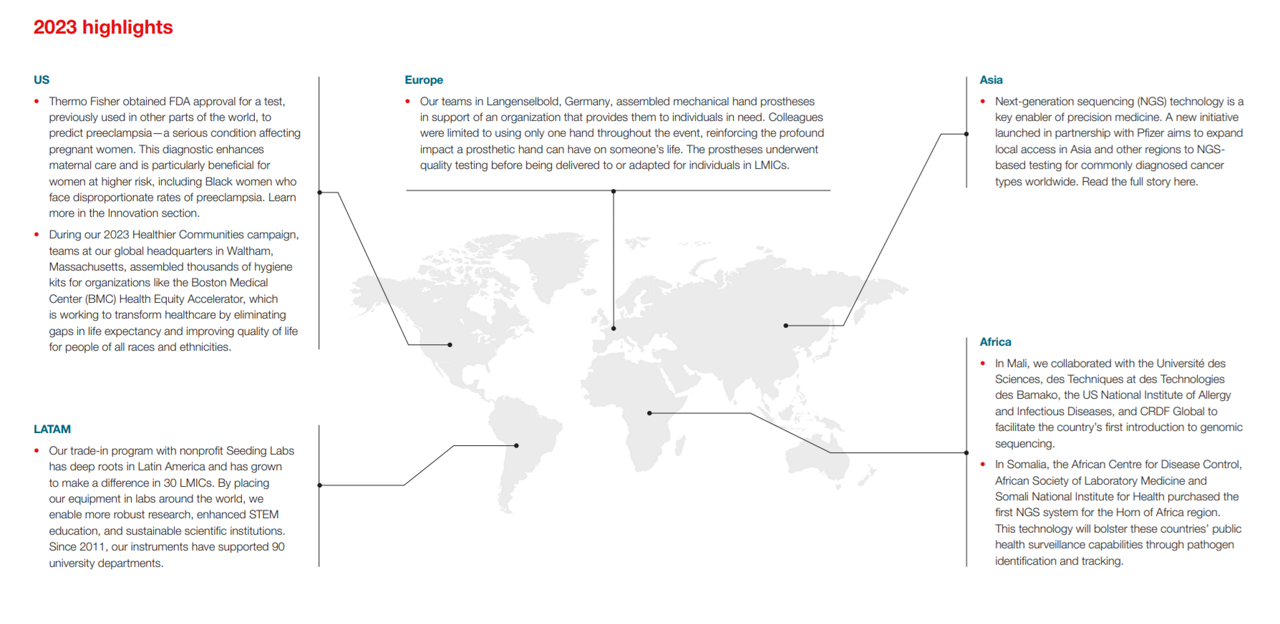Health Equity
To improve health outcomes worldwide, we are helping to build thriving health ecosystems and remove barriers to accessibility. We do this by deploying our global access program, enabling local training and manufacturing, creating strategic partnerships, and increasing diversity in clinical trials.
Our approach to advancing health equity is centered on:
- Customers: We serve as a trusted partner and an end-to-end provider of affordable and scalable health solutions that enable customers to reach as many people as possible with lifesaving products and services
- Patients: We advance equity in clinical research by making trials more inclusive, representative and accessible to understudied patient populations
- Communities: We amplify our local impact through partnerships with organizations on the frontlines of disease prevention and healthcare
Global access program
As a company with unmatched capabilities across an extensive, integrated portfolio, Thermo Fisher is uniquely positioned to work with our customers, governments and health organizations to help address health disparities. Together, we share a focus on removing the barriers that prevent people from receiving the highest standard of care.
Our global access program contributes to a more democratized healthcare environment by providing affordable and accessible offerings tailored to qualifying low- and middle-income countries (LMICs). With solutions that span the entire global health supply chain, we serve customers in more than 100 LMICs through this program and work with them and other stakeholders to empower community partners and influence public health policy.
Our HIV drug resistance (HIV-DR) genotyping kit was launched in 2022 as part of this program. This product more efficiently determines the best course of HIV treatment. By selling it to customers in LMICs at a fraction of the price of typical kits, we help enable better healthcare outcomes in regions like Sub-Saharan Africa, which accounts for two-thirds of people living with HIV globally. In Kenya, specifically, Thermo Fisher’s reduced-access pricing has led to a policy change by the Ministry of Health. It has since updated its HIV Prevention and Treatment Guidelines with an HIV-DR patient testing requirement.

Diversity in clinical trials
Clinical trials play a vital role in shaping the future of medicine, allowing scientists and researchers to test new treatments before they reach the market, but trials have historically lacked diversity. We believe that all patients deserve access to the latest advancements in life-saving therapies, so we are disrupting traditional clinical research approaches to make studies more inclusive so our customers can safely introduce new medicines to as many people as possible.
Thermo Fisher’s longstanding commitment to embedding inclusive strategies throughout the drug development process enables our customers to
gain more insight into the efficacy of cutting-edge medicines in different populations so they can drive more positive patient outcomes. Our dedicated team advises customers on patient-focused strategies and provides them with specialized hands-on support to enhance trial diversity at the study level. To address known barriers to clinical trial participation, we have:
- Developed tailored trainings and tools for our teams, site staff and research sites
- Created an alliance of clinical research sites that serve diverse patient populations to foster community, build skillsets and facilitate more opportunities for them to support our customers’ goals
- Deepened partnerships with organizations, associations and institutions to reach understudied populations where they are
As we progress, we believe these efforts will contribute to advancing health equity by making a positive impact on the lives of patient populations worldwide.